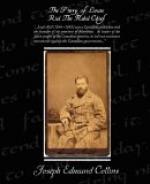“Your honours and gentlemen of the jury:—I am taking the circumstances of my trial as they are. The only thing to which I would respectfully call your attention before you retire to deliberate is the irresponsibility of the Government. It is a fact that the Government possesses an absolute lack of responsibility, an insanity complicated with analysis. A monster of irresponsible, insane government, and its little North-West council, had made up their minds to answer my petitions by surrounding me, and by suddenly attempting to jump at me and my people in the fertile valley of the Saskatchewan. You are perfectly justified in declaring that having my reason and sound mind, I acted reasonably and in self-defence, while the Government, my aggressor, being irresponsible, and consequently insane, cannot but have acted madly and wrong; and if high treason there is, it must be on its side, not on my part.”
At the conclusion of Riel’s lengthy address, MR. CHRISTOPHER ROBINSON, Q.C., closed the case for the Crown in a powerful speech, which went far to counteract the sympathetic effect produced by Riel’s disconnected but eloquent oration. Mr. Robinson pointed out that no evidence was produced to show that the prisoner had not committed the acts he was charged with. From the evidence it was quite clear the prisoner was neither a patriot nor a lunatic. If prisoner was not responsible for the rebellion, who was? The speaker went over the evidence and showed that Riel’s acts were not those of a lunatic, but well considered in all their bearings, and the deliberate acts of a particularly sound mind. The evidence as to Riel’s confinement in an asylum nine years ago was not satisfactory. Why was he sent there under an assumed name? Why was the record of his case not produced along with the other papers, and a statement of his condition when leaving the asylum? Medical men were not always the best judges of insanity. Taking up the evidence against the prisoner, Mr. Robinson went over it in detail, and said no mercy should be shown one who had committed such acts. He pictured the terrible results if Riel had succeeded in his effort to rouse the Indians, The reason the prisoners Poundmaker and Big Bear had not been put in the witness box, was that they could not be asked to give evidence that would incriminate themselves.
MR. JUSTICE RICHARDSON then read over the evidence to the jury, after which the court adjourned.
THIRD DAY’S PROCEEDINGS.
[Footnote: This abstract of the final day’s proceedings we take from the Toronto Mail.]
The court resumed its sittings on the morning of the 1st of August, at the usual hour, and Col. Richardson continued his charge to the jury He read all the principal evidence, commenting thereon, and finally charged the jury to do their duty without fear or favour.




